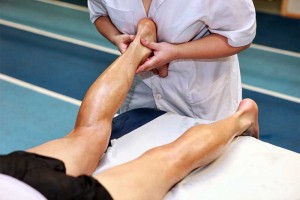 Achilles tendinopathy is an, unfortunately, common complaint seen in a physiotherapy clinic. Achilles tendon pain is usually due to small tears in the tendon which can develop over time.
Achilles tendinopathy is an, unfortunately, common complaint seen in a physiotherapy clinic. Achilles tendon pain is usually due to small tears in the tendon which can develop over time.
This may occur due to a single incident of overstretching or straining the tendon, or through general overuse wherein the tendon becomes worn and damaged.
Several factors can contribute to the development of Achilles Tendonitis (as it is also called).
These include:
[su_list_fav]- Wearing high-heeled shoes that shorten and tighten the calf muscle
- A sudden increase in the amount of weight bearing training such as walking or running
- Poor footwear that rubs against the tendon or does not support the foot adequately
- Training on hard or uneven surfaces e.g. road running, beach running, and running up hills is notorious for this
- Insufficient stretching and/or recovery between training sessions
- Poor foot biomechanics – excessive pronation is the most common
- Weight gain.
Achilles symptoms include pain in the Achilles tendon, heel or lower calf. Tenderness to pressure, redness and swelling are common. There may be difficulty rising up onto your toes, particularly when standing on 1 leg only. In some cases, it can be difficult to put the foot on the floor after a training session, or upon your first step in the morning.
Physiotherapy treatment may include the following:
[su_list_fav]- Correction of foot biomechanics – advice on footwear and/or the prescription of orthotics
- Loosening of muscle and joint structures that may be impairing or altering normal movement of the calf muscles and ankle joint
- Mobilising or manipulating the bones of the ankle and the foot
- Stretching and releasing the muscles of the calf
- Strengthening program to prevent re-injury.
Early physiotherapy treatment for this problem is vital as it can become difficult to resolve the longer it has been there. Full rehabilitation is important to achieve an optimum outcome and prevent re-occurrence.
